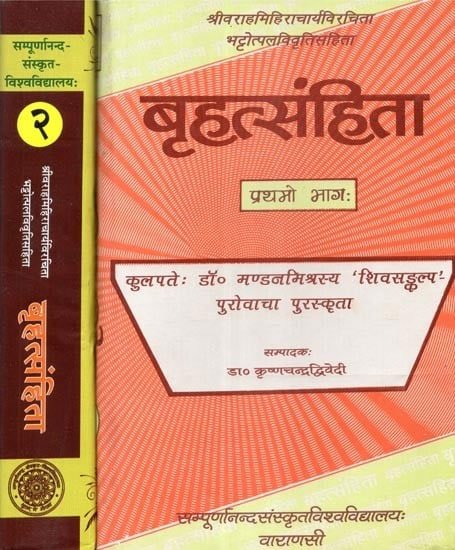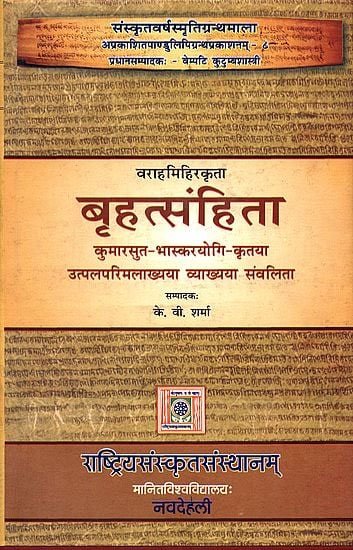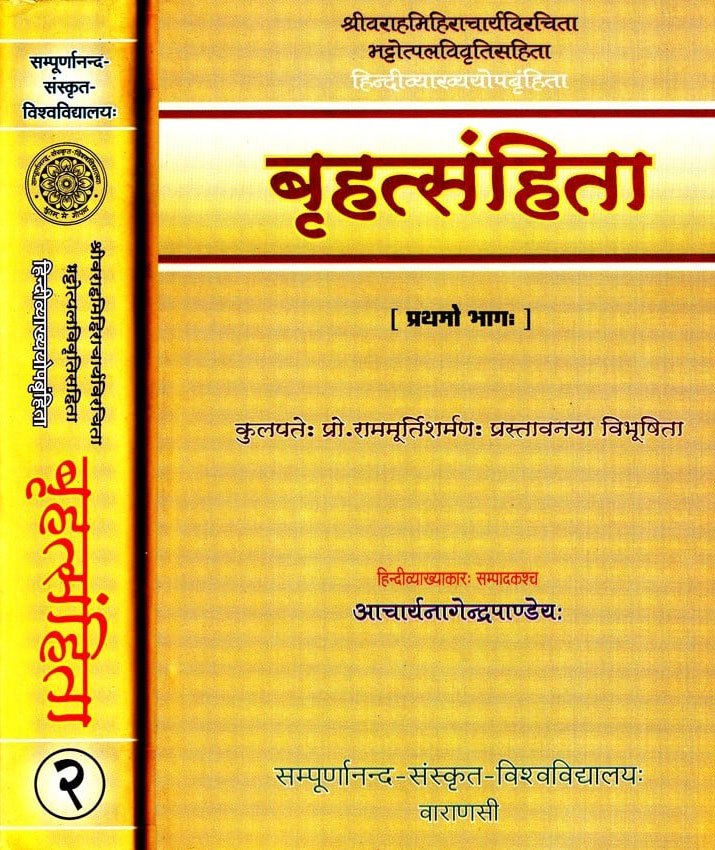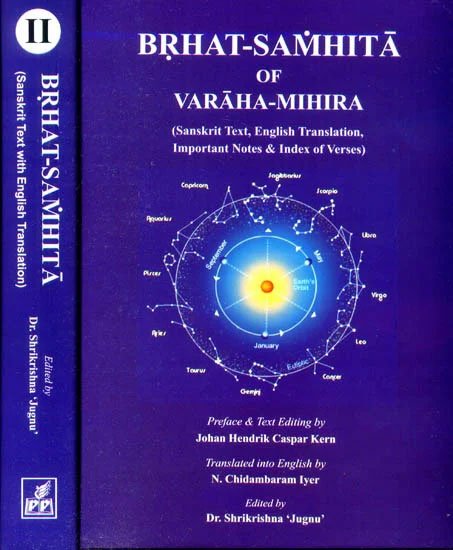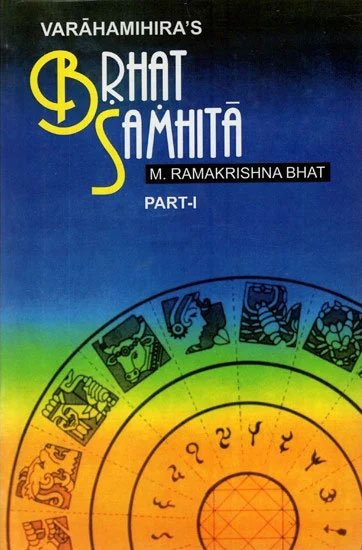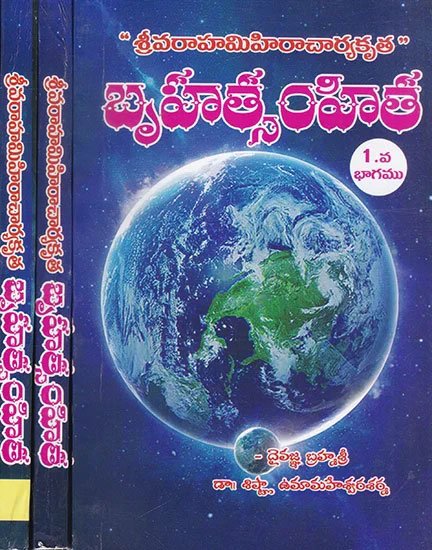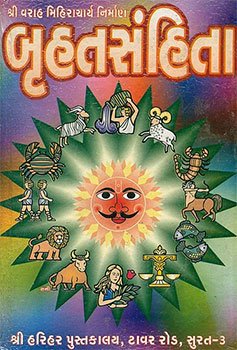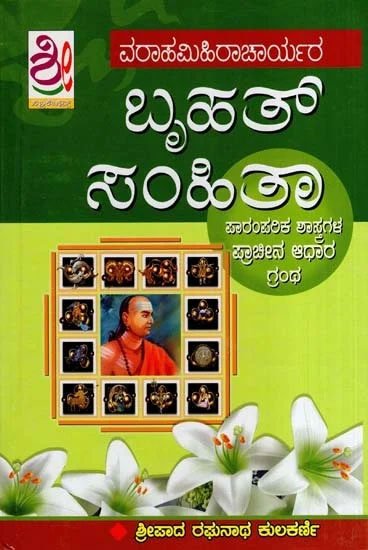Brihat-samhita [sanskrit]
26,560 words
The Sanskrit text of the Brihat-samhita from the 6th-century authored by Varaha Mihira in present-day Ujjain, India. It primarily deals with astrology and astronomy but is presented as an encyclopedia of knowledge.
Verse 65.1
दीर्घग्रीवाक्षिकूटस्त्रिकहृदयपृथुस्ताम्रताल्वोष्ठजिह्वः सूक्ष्मत्वक्केशवालः सुशफगतिमुखो ह्रस्वकर्णौष्ठपुच्छः ।
जङ्घाजानूरुवृत्तः समसितदशनश्चारुसंस्थानरूपो वाजी सर्वाङ्गशुद्धो भवति नरपतेः शत्रुनाशाय नित्यम् ॥ १ ॥
dīrghagrīvākṣikūṭastrikahṛdayapṛthustāmratālvoṣṭhajihvaḥ sūkṣmatvakkeśavālaḥ suśaphagatimukho hrasvakarṇauṣṭhapucchaḥ |
jaṅghājānūruvṛttaḥ samasitadaśanaścārusaṃsthānarūpo vājī sarvāṅgaśuddho bhavati narapateḥ śatrunāśāya nityam || 1 ||
The Sanskrit text of Verse 65.1 is contained in the book Brihata Samhita (Sanskrit Text with Hindi Translation) by Pandit Achyutananda Jha. This book is available online or you could buy the latest edition:
Read online Buy now! The Sanskrit text by Pandit Achyutananda Jha (2001)
Glossary of Sanskrit terms
Note: This extracts Sanskrit terms and links to English definitions from the glossary, based on an experimental segmentation of verse (65.1). Some terms could be superfluous while some might not be mentioned. Click on the word to show English definitions.
Dirghagriva, Akshikuta, Stri, Hridaya, Prithu, Tamrata, Alu, Tha, Jihva, Sukshma, Tvac, Keshava, Alas, Sushaphagatimukha, Hrasvakarna, Aushtha, Puccha, Jangha, Ajanu, Uru, Vritta, Tada, Shana, Caru, Samsthana, Rupa, Vaji, Vajin, Sarvanga, Shuddha, Bhavati, Bhavat, Bhavant, Narapati, Nasha, Nityam, Nitya,
Analysis of Sanskrit grammar
Note: this is an experimental feature and only shows the first possible analysis of the Sanskrit text (Verse 65.1). If the system was successful in segmenting the sentence, you will see of which words it is made up of, generally consisting of Nouns, Pronouns, Verbs, Participles and Indeclinables. Click on the link to show all possible derivations of the word.
- Line 1: “dīrghagrīvākṣikūṭastrikahṛdayapṛthustāmratālvoṣṭhajihvaḥ sūkṣmatvakkeśavālaḥ suśaphagatimukho hrasvakarṇauṣṭhapucchaḥ ”
- dīrghagrīvā -
-
dīrghagrīva (noun, masculine)[compound], [vocative single]dīrghagrīva (noun, neuter)[compound], [vocative single]dīrghagrīvā (noun, feminine)[nominative single]
- akṣikūṭa -
-
akṣikūṭa (noun, neuter)[compound], [vocative single]
- stri -
-
strī (noun, feminine)[adverb], [vocative single]
- ka -
-
ka (noun, neuter)[compound], [vocative single]
- hṛdaya -
-
hṛdaya (noun, masculine)[compound], [vocative single]hṛdaya (noun, neuter)[compound], [vocative single]
- pṛthus -
-
pṛthu (noun, masculine)[nominative single]
- tāmratā -
-
tāmratā (noun, feminine)[nominative single]
- alvoṣ -
-
alu (noun, feminine)[genitive dual], [locative dual]
- ṭha -
-
ṭha (noun, masculine)[compound], [vocative single]
- jihvaḥ -
-
jihva (noun, masculine)[nominative single]
- sūkṣma -
-
sūkṣma (noun, masculine)[compound], [vocative single]sūkṣma (noun, neuter)[compound], [vocative single]
- tvak -
-
tvac (noun, feminine)[compound], [adverb], [nominative single], [vocative single]
- keśavā -
-
keśava (noun, masculine)[compound], [vocative single]keśava (noun, neuter)[compound], [vocative single]keśavā (noun, feminine)[nominative single]
- alaḥ -
-
alas (noun, masculine)[compound], [vocative single]alas (noun, neuter)[compound], [nominative single], [vocative single], [accusative single]
- suśaphagatimukho* -
-
suśaphagatimukha (noun, masculine)[nominative single]
- hrasvakarṇau -
-
hrasvakarṇa (noun, masculine)[compound], [nominative dual], [vocative single], [vocative dual], [accusative dual]
- auṣṭha -
-
auṣṭha (noun, masculine)[compound], [vocative single]auṣṭha (noun, neuter)[compound], [vocative single]
- pucchaḥ -
-
puccha (noun, masculine)[nominative single]
- Line 2: “jaṅghājānūruvṛttaḥ samasitadaśanaścārusaṃsthānarūpo vājī sarvāṅgaśuddho bhavati narapateḥ śatrunāśāya nityam ”
- jaṅghā -
-
jaṅgha (noun, masculine)[compound], [vocative single]jaṅghā (noun, feminine)[nominative single]
- ājānū -
-
ājānu (indeclinable)[indeclinable]
- uru -
-
uru (indeclinable)[indeclinable]uru (noun, masculine)[compound], [adverb]uru (noun, neuter)[compound], [adverb], [nominative single], [vocative single], [accusative single]
- vṛttaḥ -
-
vṛtta (noun, masculine)[nominative single]√vṛt -> vṛtta (participle, masculine)[nominative single from √vṛt class 1 verb]
- samasi -
-
√sam (verb class 1)[present active second single]
- tada -
-
tada (noun, masculine)[compound], [vocative single]tada (noun, neuter)[compound], [vocative single]
- śanaś -
-
śana (noun, masculine)[nominative single]
- cāru -
-
cāru (indeclinable)[indeclinable]cāru (noun, masculine)[compound], [adverb]cāru (noun, neuter)[compound], [adverb], [nominative single], [vocative single], [accusative single]
- saṃsthāna -
-
saṃsthāna (noun, masculine)[compound], [vocative single]saṃsthāna (noun, neuter)[compound], [vocative single]
- rūpo* -
-
rūpa (noun, masculine)[nominative single]
- vājī -
-
vājī (noun, masculine)[compound]vājī (noun, feminine)[compound], [nominative single]vāji (noun, masculine)[nominative dual], [vocative dual], [accusative dual]vājin (noun, masculine)[nominative single]
- sarvāṅga -
-
sarvāṅga (noun, masculine)[compound], [vocative single]sarvāṅga (noun, neuter)[compound], [vocative single]
- śuddho* -
-
śuddha (noun, masculine)[nominative single]√śudh -> śuddha (participle, masculine)[nominative single from √śudh class 1 verb], [nominative single from √śudh class 4 verb]
- bhavati -
-
bhavatī (noun, feminine)[adverb], [vocative single]bhavat (noun, masculine)[locative single]bhavat (noun, neuter)[locative single]bhavant (pronoun, masculine)[locative single]bhavant (pronoun, neuter)[locative single]√bhū (verb class 1)[present active third single]
- narapateḥ -
-
narapati (noun, masculine)[ablative single], [genitive single]
- śatru -
-
śatru (noun, masculine)[compound], [adverb]
- nāśāya -
-
nāśa (noun, masculine)[dative single]
- nityam -
-
nityam (indeclinable)[indeclinable]nitya (noun, masculine)[adverb], [accusative single]nitya (noun, neuter)[adverb], [nominative single], [accusative single]nityā (noun, feminine)[adverb]
Other editions:
Also see the following editions of the Sanskrit text or (alternative) English translations of the Verse 65.1
Brhatsamhita with the Commentary of Bhattotpala
by Krishna Chandra Dwivedi (2016)
Publisher: Sampurnanand Sanskrit University; 1229 pages;
Buy now!
Brihat Samhita with the Commentary of Utpalapatimala of Yogisvara
by K. V. Sharma (2012)
Publisher: Rashtriya Sanskrit Sansthan, Janakpuri; 754 pages; ISBN-10; 8186111360; ISBN-13: 9788186111369
Buy now!
Brihat Samhita (Hindi Translation)
by K. V. Sharma (2002)
Publisher: Sampurnanand Sanskrit University; 2359 pages; ISBN-13: 9789387890008.
Buy now!
Brhat Samhita (English translation)
by N. Chidambaram Iyer (2022)
Publisher: Parimal Publication Pvt. Ltd.; 801 pages; Edited by Dr. Shrikrishna Jugnu; ISBN-10: 8171104215; ISBN-13: 9788171104215.
Buy now!
Brhat Samhita (English with notes)
by M. Ramakrishna Bhat (2010)
Publisher: Motilal Banarsidas Publishers Pvt. Ltd.; 1155 pages; ISBN-10: 8120810600; ISBN-13: 9788120810600.
Buy now!
Brhat Samhita (Telugu translation)
by Sishtla Umamaheswara Sharma (2020)
Publisher: Mohan Publications, Andhra Pradesh; 846 pages.
Buy now!Preview of verse 65.1 in Kannada sript:
ದೀರ್ಘಗ್ರೀವಾಕ್ಷಿಕೂಟಸ್ತ್ರಿಕಹೃದಯಪೃಥುಸ್ತಾಮ್ರತಾಲ್ವೋಷ್ಠಜಿಹ್ವಃ ಸೂಕ್ಷ್ಮತ್ವಕ್ಕೇಶವಾಲಃ ಸುಶಫಗತಿಮುಖೋ ಹ್ರಸ್ವಕರ್ಣೌಷ್ಠಪುಚ್ಛಃ ।
ಜಙ್ಘಾಜಾನೂರುವೃತ್ತಃ ಸಮಸಿತದಶನಶ್ಚಾರುಸಂಸ್ಥಾನರೂಪೋ ವಾಜೀ ಸರ್ವಾಙ್ಗಶುದ್ಧೋ ಭವತಿ ನರಪತೇಃ ಶತ್ರುನಾಶಾಯ ನಿತ್ಯಮ್ ॥ ೧ ॥
Brhat Samhita (Gujarati translation)
by - (2000)
Publisher: Shree Harihar Pustakalay, Surat; Author: Shri Varahamihira Acharya (શ્રી વરાહમિહીરાચાર્ય); 432 pages.
Buy now!Preview of verse 65.1 in Gujarati sript:
દીર્ઘગ્રીવાક્ષિકૂટસ્ત્રિકહૃદયપૃથુસ્તામ્રતાલ્વોષ્ઠજિહ્વઃ સૂક્ષ્મત્વક્કેશવાલઃ સુશફગતિમુખો હ્રસ્વકર્ણૌષ્ઠપુચ્છઃ ।
જઙ્ઘાજાનૂરુવૃત્તઃ સમસિતદશનશ્ચારુસંસ્થાનરૂપો વાજી સર્વાઙ્ગશુદ્ધો ભવતિ નરપતેઃ શત્રુનાશાય નિત્યમ્ ॥ ૧ ॥
Brhat Samhita (Kannada translation)
by Sripada Raghunatha Kulkarni (2021)
Publisher: Srinidhi Publications, Bangalore; 668 pages with illustrations.
Buy now!Preview of verse 65.1 in Kannada sript:
ದೀರ್ಘಗ್ರೀವಾಕ್ಷಿಕೂಟಸ್ತ್ರಿಕಹೃದಯಪೃಥುಸ್ತಾಮ್ರತಾಲ್ವೋಷ್ಠಜಿಹ್ವಃ ಸೂಕ್ಷ್ಮತ್ವಕ್ಕೇಶವಾಲಃ ಸುಶಫಗತಿಮುಖೋ ಹ್ರಸ್ವಕರ್ಣೌಷ್ಠಪುಚ್ಛಃ ।
ಜಙ್ಘಾಜಾನೂರುವೃತ್ತಃ ಸಮಸಿತದಶನಶ್ಚಾರುಸಂಸ್ಥಾನರೂಪೋ ವಾಜೀ ಸರ್ವಾಙ್ಗಶುದ್ಧೋ ಭವತಿ ನರಪತೇಃ ಶತ್ರುನಾಶಾಯ ನಿತ್ಯಮ್ ॥ ೧ ॥
![Brihat-samhita [sanskrit] - book cover](/uploads/a/Brihat-Samhita-Sanskrit.jpg)
